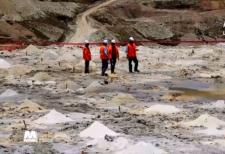
More Mining-Related Violence In Peru
Violence erupted at a major mining development in southern Peru this week, as local community protestors mobilised against the development of the Las Bambas copper project, now owned by a consortium of Chinese companies, following a sale by Glencore a couple of years ago.
Four people were killed in the Challhuahuacho district of the province of Cotabambas in the south west of Peru, as protestors who entered and occupied an area of the project were shot dead.
As reported on local radio, the protestors oppose the construction of a processing plant in Challhuahaucho, which has about 20,000 inhabitants.
They are also demanding that more local workers be employed in the construction and development of the project, which only broke ground in August.
The Chinese owners of Las Bambas, MMG and CITIC, had hoped to have the project up and running in the first quarter of next year, and given the robust attitude of the Peruvian president towards the protestors, that may still happen.
But both the government and MMG, which acts as operator at Las Bambas, now have a problem.
It’s well known in Peruvian politics that the right time to air a grievance is just before an election.
The next round of Peruvian elections will take place on 10th April 2016 and already various factions are manoeuvring for position.
As we’ve reported on these pages in recent weeks, unrest has stirred up in the Andes at Minera IRL’s small gold project at Corihuarmi, and at its much bigger development at Ollachea province in Puno, right in the south.
Periodically, trouble also breaks out at Newmont’s famous Yanacocha mine in the northern district of Cajamarca. Peru’s elections take place every five years, and it’s perhaps no coincidence that the worst of the violence at Yanacocha has taken place either ahead of or during the election years of 2001, 2006 and 2011.
So community relations workers up in Cajamarca ought now to be on high alert.
The reasons why these mining projects become such flashpoints are many and varied.
First, there’s the old schisms in communities going back to the times of the conquistadors. The conquistadors, as is widely known came primarily for plunder, and the form that plunder took was gold and other precious metals.
This is not a good precedent for the modern mining industry to be following. The subsequent history of the mining industry inside Peru and across South America generally did much to reinforce these initial impressions of imperial plunderers a work, although in recent years there has been a concerted effort by the industry to clean up its image.
Of more immediate relevance are the sheer scale and the concomitant power of these projects.
Yanacocha is reckoned to be the world’s fourth largest gold mine, while Las Bambas is thought likely to add around 1.4% to Peru’s GDP.
In that context, the official reaction to the violence at Las Bambas was noticeable for its virulence. President Ollanta Humala was straight out of the blocks calling for talks to settle the dispute and describing how protestors had unlawfully occupied MMG property.
If that wasn’t enough of a statement of intent, the government then imposed a state of emergency across six provinces.
This involves a suspension of the right of free assembly and permission for police to search homes without a warrant.
Strident measures which go towards underlining the importance of the development of Las Bambas to the country.
On that score though, the protestors wouldn’t necessarily disagree. They’ve called for the re-siting of a processing plant, which they claim would originally have been located elsewhere under old plans.
But they’ve also called for more local jobs to be generated by the project, which has already consumed US$10 billion of capital.
Wanting to work for a project is not an unequivocally hostile stance to take, but as is the way with these things, it’s striking the right balance that’s really key.
The Chinese are known the world over for shipping in their own labour. One gets the impression that if they attempt that here, the final stages of development work at Las Bambas might become becalmed for several years.
With the election coming, though, now is the time to settle these matters. And everybody knows it.





